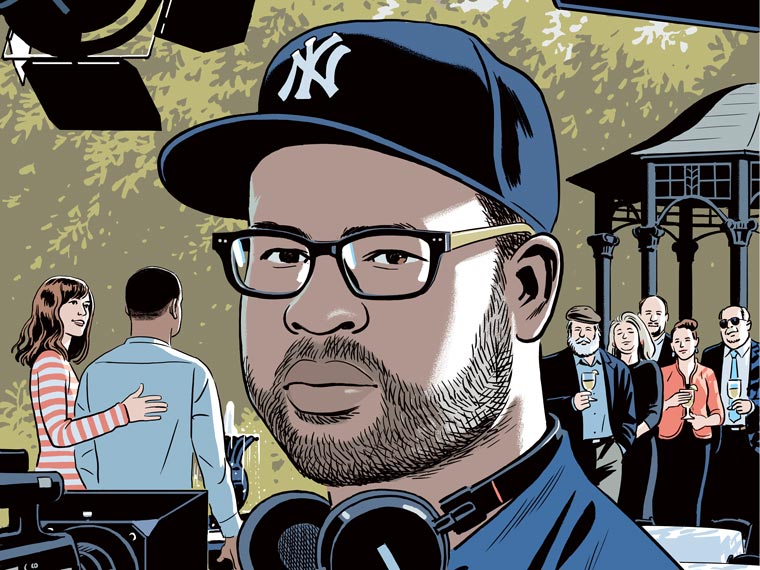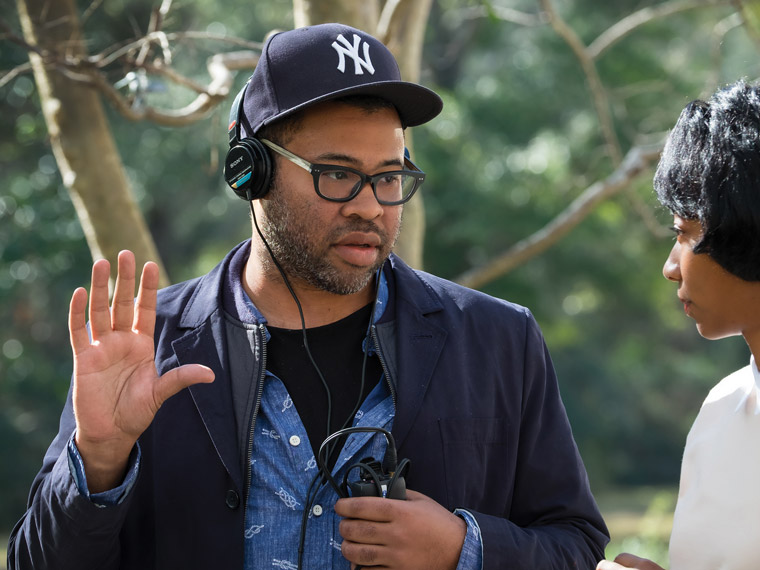In the post-Obama era, comedian and sketch actor Jordan Peele ’01 helped propel the national conversation on race with Get Out, the social thriller he wrote and directed.
After Barack Obama’s victory in 2008, there was much gauzy, hopeful talk that America had turned to a fresh page in its history—that by choosing a black man as its president, the nation was choosing to move beyond the racial divisions that had torn it since its birth. Jordan Peele ’01 wasn’t buying it.
He was a rising comedy star the year of Obama’s election, near the end of a five-year run on MADtv, the Fox network’s raucous throwdown to Saturday Night Live, transforming himself weekly into an indelible assortment of characters, from James Brown to the new president. Although shorter and rounder than Obama, Peele did an impression so dead on that SNL tried to hire him away, but Fox wouldn’t release him from his contract. “That spelled out the end of a chapter,” Peele says. “The question became, ‘What next?’ And I think one of the things I learned from Sarah Lawrence is that you have to trust your gut and listen to your heart—and you won’t regret a decision made by your heart.”
He was already a master of the three-minute comedy sketch, television’s equivalent of a pop single, but he started thinking on the larger scale of a symphony. He had a theme—the delusion at the heart of all the talk about a transformed “post-racial” nation—and he had a form he wanted to explore it in: a feature-length movie. “My gut was pointing me back in the direction of my original dream, which was to be a film director, someone who is a storyteller and is able to use everything we have in modern storytelling to tell that story,” he says.
“... Push boundaries in a way that’s new and fresh and scary, and you might risk turning people off. If you can do those things and package it in a way that doesn’t turn people off, then you have something important.”
He started writing the script for what became the breakout hit that pushed the conversation about race in America into new territory this year: Get Out, the highest-grossing film debut ever by a black director. “I started on it at that moment when there was this huge cultural shift—Obama getting elected—and it took me several years to figure out what I was trying to say, but really what was gnawing on me about the period was the post-racial lie of it,” he says about the script, which he worked on as he developed and starred in another sketch comedy show, Key & Peele, on the Comedy Central network.
Our culture marches along many routes, some merging, some diverging, and the direction of each is set by leaders of many stripes, from politics and commerce, arts and the academy. Peele emerged as one of those cultural leaders this year by mashing up venerable Hollywood genres—the message film and the horror flick—in a movie that scared viewers as much as it made them think. Get Out earned more than $250 million on a $4.5 million budget, the kind of critical and commercial success that has earned him a rare measure of creative freedom and influence.
“I wanted to make a film that acknowledges neglect and inaction in the face of the real race monster,” Peele told The New York Times when the movie was released in February, and then spoke even more figuratively in his commentary when it was released on DVD. “In many ways, the African American experience is this country’s Frankenstein monster.”
Peele made his TV debut in 1994, on an ABC News special where President Bill Clinton took questions from children. “How can you help the families where there’s a mom, and she’s taking care of a kid or kids, and the father isn’t willing or isn’t able to pay child support?” he asked. It was not a theoretical question. He grew up on the Upper West Side, the only child of a single mother. His mother is white; his father, whom he barely knew and who died in 1999, was black.
He aspired toward NYU film school, aiming to make movies like the directors he revered: Steven Spielberg, Tim Burton, Stanley Kubrick, David Cronenberg, Ridley Scott, James Cameron, Alfred Hitchcock. But then he visited Sarah Lawrence. “I just fell in love with it, with the campus and the atmosphere and the culture there,” he says. “I think part of me was just understanding the value of a well-rounded liberal arts education.”
As a first-year, he took a puppetry class with Dan Hurlin ’79 (director, graduate program in theatre), learning how to bring inanimate figures to life. “That really spoke to my soul the most, so I decided to build a curriculum that I considered a puppetry major,” he says.
But he soon learned he had a cast of characters in his own head that he could bring to life more vividly by standing on stage and performing himself. With about a half-dozen other students in a comedy class with Christine Farrell (director, theatre program), he formed an improvisational comedy group called Judith. “It was kind of ironically named after Judith Light, the actress,” he says. The troupe wrote and performed several shows on campus, but it soon became evident that Peele’s talent needed a bigger forum. He left Sarah Lawrence after his sophomore year and started working his way up through the ranks of the comedy business: Boom Chicago in Amsterdam, Second City in Chicago, MTV. He and a Judith colleague, Rebecca Drysdale ’01, later a writer on Key & Peele, performed together as Two White Guys.
“In some ways, Sarah Lawrence really works too well,” he says. “Within two years I figured out exactly what I wanted to do, and I knew I had to focus on it.”
By 2003 he was in the cast of MADtv and working with Keegan-Michael Key, another biracial comic actor with a gift for inhabiting multiple characters. The show’s humor tended to aim lower than SNL’s (sketches such as “Pimp Your Bride” and “Somebody Stole My Weed”), and Peele did a lot of celebrity impersonations: Whoopi Goldberg, Tiger Woods, Morgan Freeman. In a nod to his intended major, he also did Big Bird.
As Peele’s chemistry with Key deepened on the show over the next five years, so did his humor, spelunking through the twisting caverns of race. Among his recurring characters was Dontel LaMontrose, a black husband whose white wife was clueless about her own racism. By early 2012, when Obama was running for his second term, Key and Peele had their own eponymous show, and their sketches about the president (played with such uncanny precision by Peele that Obama himself called him his favorite impersonator) and his “anger translator” Luther, played by Key, added a penetrating and riotous new dimension to the nation’s political discourse.
“The election of Donald Trump and Get Out dropping within two months, I don’t think it’s an accident. ... Did I know that we would be here in this, living in this country? No, but I think both things were responses to the Obama era.”
“The reason I like comedy is because when it’s done well it can be important,” Peele says. “The way that I get to something is by following some of my comedic training, which is go toward the truth, wherever it takes you. The truth will resonate, and people will thank you for saying it. Push boundaries in a way that’s new and fresh and scary, and you might risk turning people off. If you can do those things and package it in a way that doesn’t turn people off, then you have something important.”
The productions grew more polished, the writing more adventurous, the commentary more incisive. In “Suburban Zombies,” the black humans partied while the flesh-craving white zombies, racist even in death, refused to eat them. In “Sex with Black Guys,” Key and Peele oscillated wordlessly between lust and disgust as they overheard two white women exchange the most egregious stereotypes. And “Negrotown” offered a withering fantasy sequence of a candy-colored utopia where “you can wear your hoodie and not get shot.”
“I definitely had a tremendous amount of growth,” he says. “MADtv was not a perfect fit, and I was taught a lot of lessons then. One of the biggest things I took away from it is that even when this life-changing opportunity came along, it didn’t mean that you get on a show and the floodgates just open up and my full potential will be achieved and revealed. I think ultimately every door that opened sort of presented a whole new bunch of obstacles and traps, and figuring out how to navigate those made me clearer in my voice and my vision.”
All this time, Peele was going deeper still as he worked to make the movie he calls a “social thriller,” using the form of the horror movies he geeked out on as a kid to explore ideas they had rarely considered before. The story is about what happens when a black man visits the family of his white girlfriend; the horror is what happens in a house that is haunted not by ghosts but by racism.
During the years of the movie’s gestation, the nation was roused from its post-racial fantasy by a series of police shootings of black men and the emergence of Black Lives Matter. By the time Get Out was released in February, events had cast it in yet another light. “The election of Donald Trump and Get Out dropping within two months, I don’t think it’s an accident,” Peele says. “Did I know that we would be here in this, living in this country? No, but I think both things were responses to the Obama era. I think Donald Trump’s election was a response to the fact that Obama was elected and people didn’t like that. Mine was a response to the culture I was seeing and in some ways a response to the response to the Obama era. I think they’re from the same thing in a way.”
Despite his extravagant skills as a performer, Peele does not plan to return to sketch comedy. “I think it just became a thing where performing isn’t as fun to me as it is to sit in a room and map out how a story is going to go,” he says. “First of all, I did a ton of performing, and second of all, I think there’s a limit to the amount of fun you can have performing, and it was never going to get any more fun than Key & Peele. That was like a performer’s dream. So stepping out of Key & Peele so I could do Get Out, I just knew it was the right move, and making Get Out was the most fun I’ve ever had in any job.”
An industry that was initially skeptical about his pitch for Get Out and reluctant to make a movie many executives expected would be no more than a horror spoof is now listening more carefully to what Peele has to say. He has a first-look deal with Universal Pictures that includes Peele writing, directing, and producing another social thriller, and he will be an executive producer—along with J.J. Abrams ’88—of Lovecraft Country, a new anthology horror series for HBO.
“I always thought that the best outcome after making Get Out would be if somebody let me make another movie after that,” he says. “Nothing is more fun, nothing more rewarding than that process.”
Written by Kevin Coyne
Illustration by R. Kikuo Johnson
Photo by Justin Lubin / Universal Pictures

